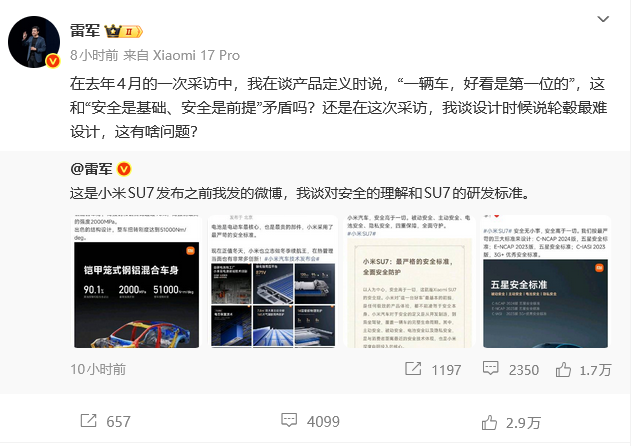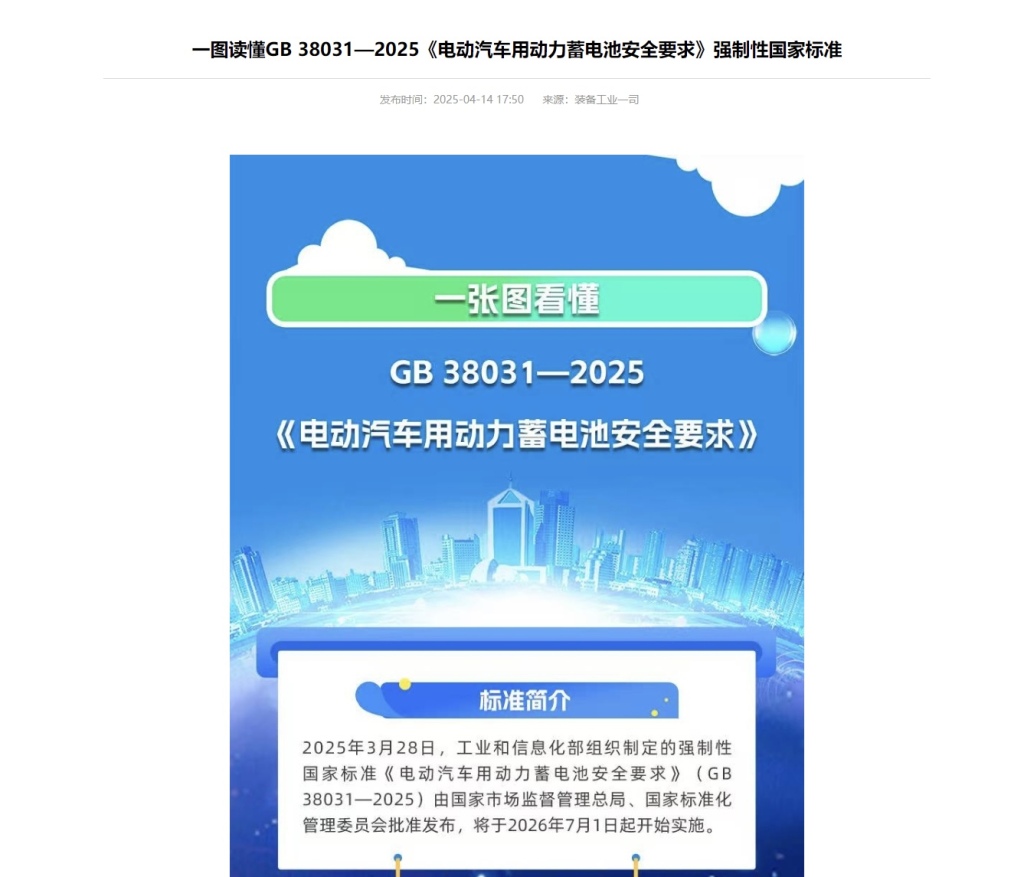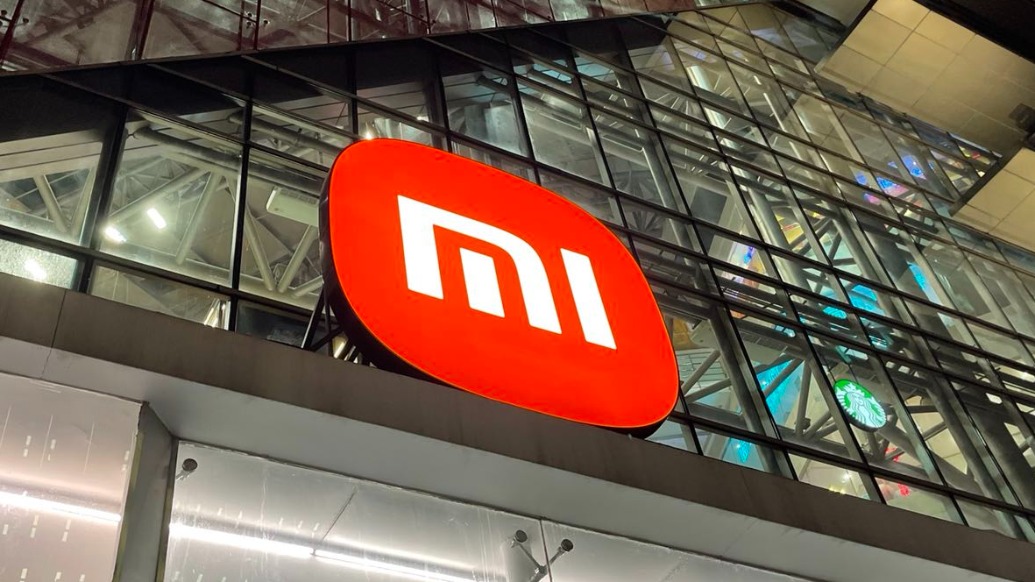
In one day, Lei Jun, the founder of Xiaomi, posted three Weibo posts discussing car safety.
On November 16, Lei Jun posted on Weibo: In an interview last April, when discussing product definition, he said, "For a car, looking good is the most important thing." Does this contradict "Safety is the foundation and the prerequisite"? He also questioned: "In the same interview, when discussing design, I said that the wheel rims are the most difficult to design. What's wrong with that?"



Lei Jun cited a Weibo post he made on January 3, 2024, expressing his emphasis on car safety: "Xiaomi Auto, safety is paramount. Passive safety, active safety, battery safety, and privacy security—four layers of protection for comprehensive safeguards." He also posted a Weibo in December 2023: "The battery is the most crucial and expensive component of an electric vehicle, and Xiaomi has adopted the most stringent safety standards."
In response to netizens' comments, Lei Jun stated, "Many people online are taking things out of context, distorting and smearing me." This statement appears to be a direct response to external criticism.
This year, several accidents involving Xiaomi cars have put Lei Jun and his company, Xiaomi Auto, in the eye of the storm. Judging from the responses, Lei Jun did not talk about some of the technical details that had been discussed by the outside world, but he repeatedly emphasized the importance of safety and also stressed "fighting against black PR".
On October 16th, at the World Intelligent Connected Vehicles Conference, Lei Jun stated that he called on the entire industry, under the guidance of the government, to focus on safety, quality, and innovation, concentrating their efforts on technological innovation and R&D in key underlying technologies and important R&D areas. He also called for joint efforts to combat online trolls, malicious PR campaigns, and other online chaos, creating a positive, civilized, and orderly industrial development environment. Looking ahead, Xiaomi is willing to adopt a more open approach to work with all peers and partners to jointly promote industry development.
Just before Lei Jun's speech, a serious accident occurred involving Xiaomi Auto. On October 13th, according to a report from the Chengdu Public Security Bureau, at approximately 3:18 AM on October 13th, 2025, a traffic accident occurred on the southern section of Tianfu Avenue. A 31-year-old man surnamed Deng, driving a car, collided with a small sedan driven by a man surnamed Li. The accident resulted in the death of Deng, and both vehicles sustained varying degrees of damage. Tests revealed that Deng was suspected of driving under the influence of alcohol. The accident is currently under further investigation.
According to videos posted by netizens, the car involved was a Xiaomi SU7 Ultra.
On April 1st of this year, according to a report from Xiaomi, a serious traffic accident involving a Xiaomi SU7 Standard Edition occurred on the evening of March 29th, 2025, on the Chiqi section of the Deshang Expressway. The vehicle detected an obstacle, issued a warning, and began to decelerate. The driver then took control of the vehicle, continuously decelerating and steering, before colliding with a concrete barrier post. The last confirmed speed by the system before the collision was approximately 97 kilometers per hour.
These two car accidents have also dragged the previously glamorous Xiaomi Auto into a barrage of sharp questions from the outside world.
On the same day Lei Jun responded to questions about car safety, news that Wang Hua, general manager of Xiaomi's public relations department, was about to be reassigned also attracted attention. The Paper previously learned of this from sources familiar with the matter. As Xiaomi's top public relations figure, Wang Hua has repeatedly helped Xiaomi refute rumors and respond to issues on social media, becoming a well-known figure in Xiaomi's public relations. This change in position may, to some extent, alter Xiaomi's external communication strategy.
Lei Jun's recent series of statements may be due to the possibility that external public opinion could influence the capital market's judgment on Xiaomi's future trend. According to Wind data, Xiaomi's stock price has been declining since October this year, closing at HK$42.36 on November 14, down 2.62%. Xiaomi Group's stock price has fallen 22% since the beginning of September, after a period of continuous rise.
"Xiaomi's marketing strategy is to strongly tie itself to Lei Jun's personal brand, which is a double-edged sword," senior internet analyst Ding Daoshi told The Paper. "The advantage is that it can enhance the overall brand awareness of the company's products through the influencer entrepreneur. The disadvantage is that when negative events occur, Lei Jun will become the primary person held responsible. Currently, much of Xiaomi's negative public opinion is directed at Lei Jun himself. "Both Xiaomi and Lei Jun should consider how to strike a balance between corporate brand and entrepreneur's personal brand."
In his view, what Xiaomi Auto needs most right now is to use its strength to downplay the "marketing" impression. Lei Jun could focus more on Xiaomi's new breakthroughs in areas such as battery safety and autonomous driving, or the latest data from the SU7 safety test. This would not only showcase the product's hard power but also echo the previously emphasized "safety above all else," rather than getting caught up in the rhetoric controversy of "appearance versus safety." Lei Jun may have originally wanted to clarify the misunderstanding of being "taken out of context" by speaking out, but the spread of this on social media could turn the clarification into a new round of reputational controversy.
"Safety and aesthetics are not mutually exclusive in a car," said Ding Daoshi. He added that as external expectations and attention towards Xiaomi continue to rise, Xiaomi should continue to demonstrate its strong product capabilities to more effectively respond to criticisms.


